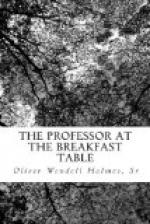—I locked the book and sighed as I laid it down. The world is always ready to receive talent with open arms. Very often it does not know what to do with genius. Talent is a docile creature. It bows its head meekly while the world slips the collar over it. It backs into the shafts like a lamb. It draws its load cheerfully, and is patient of the bit and of the whip. But genius is always impatient of its harness; its wild blood makes it hard to train.
Talent seems, at first, in one sense, higher than genius,—namely, that it is more uniformly and absolutely submitted to the will, and therefore more distinctly human in its character. Genius, on the other hand, is much more like those instincts which govern the admirable movements of the lower creatures, and therefore seems to have something of the lower or animal character. A goose flies by a chart which the Royal Geographical Society could not mend. A poet, like the goose, sails without visible landmarks to unexplored regions of truth, which philosophy has yet to lay down on its atlas. The philosopher gets his track by observation; the poet trusts to his inner sense, and makes the straighter and swifter line.
And yet, to look at it in another light, is not even the lowest instinct more truly divine than any voluntary human act done by the suggestion of reason? What is a bee’s architecture but an unobstructed divine thought?—what is a builder’s approximative rule but an obstructed thought of the Creator, a mutilated and imperfect copy of some absolute rule Divine Wisdom has established, transmitted through a human soul as an image through clouded glass?
Talent is a very common family-trait; genius belongs rather to individuals;—just as you find one giant or one dwarf in a family, but rarely a whole brood of either. Talent is often to be envied, and genius very commonly to be pitied. It stands twice the chance of the other of dying in hospital, in jail, in debt, in bad repute. It is a perpetual insult to mediocrity; its every word is a trespass against somebody’s vested ideas,—blasphemy against somebody’s O’m, or intangible private truth.
—What is the use of my weighing out antitheses in this way, like a rhetorical grocer?—You know twenty men of talent, who are making their way in the world; you may, perhaps, know one man of genius, and very likely do not want to know any more. For a divine instinct, such as drives the goose southward and the poet heavenward, is a hard thing to manage, and proves too strong for many whom it possesses. It must have been a terrible thing to have a friend like Chatterton or Burns. And here is a being who certainly has more than talent, at once poet and artist in tendency, if not yet fairly developed,—a woman, too;—and genius grafted on womanhood is like to overgrow it and break its stem, as you may see a grafted fruit-tree spreading over the stock which cannot keep pace with its evolution.




